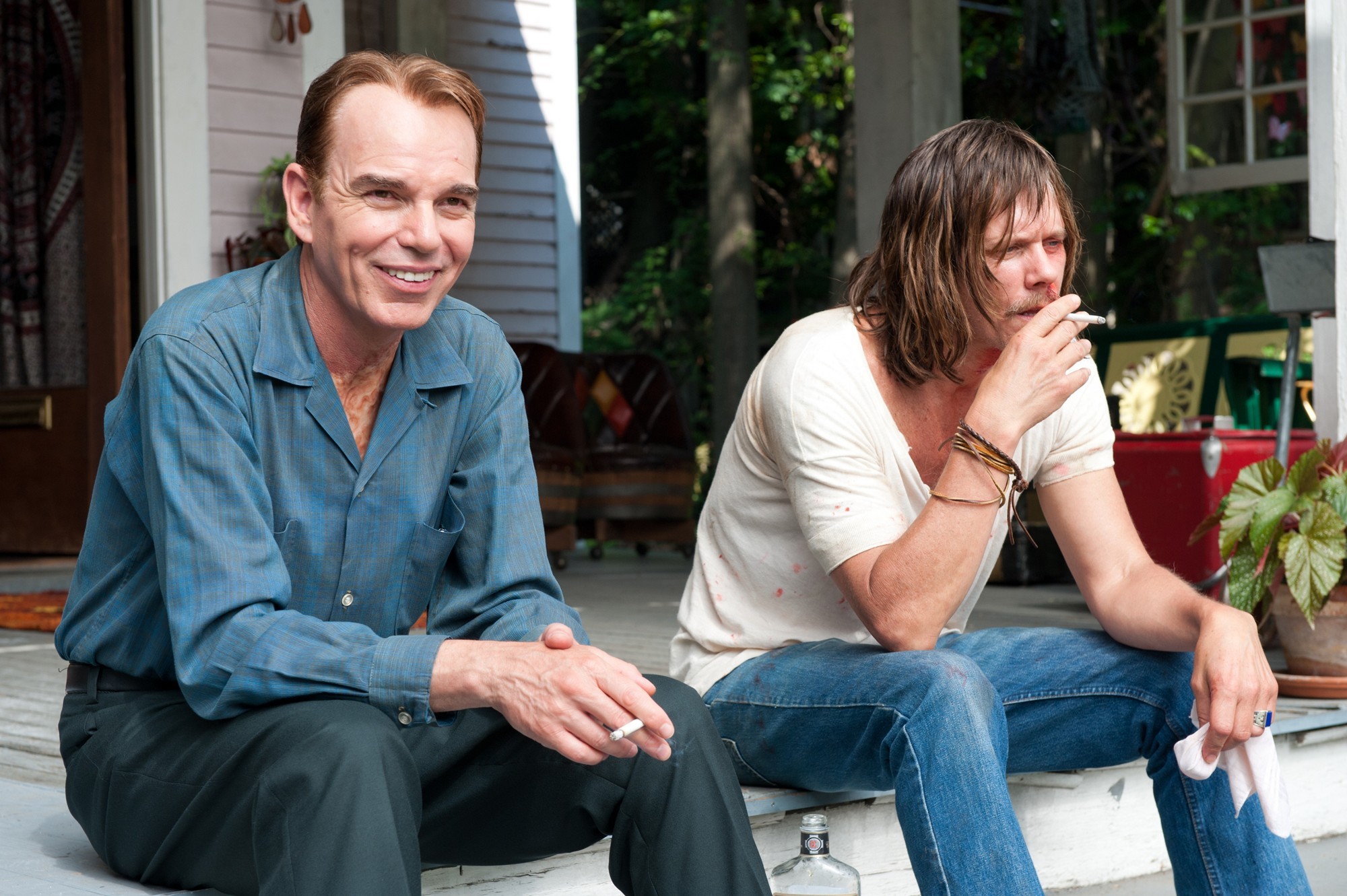Since I’m the only film writer covering this year’s Lone Star International Film Festival for the Weekly this year, I’m posting my coverage of the festival to this site instead of to our usual LSIFF blog. Perhaps this will receive more web traffic.
The festival began last night in fine fashion with Billy Bob Thornton’s Jayne Mansfield’s Car. It’s the first feature that Thornton has directed since his logy 2000 adaptation of All the Pretty Horses, and the director/co-writer was on hand along with his co-stars Robert Duvall and stand-up comic Ron White. Thornton cracked up the crowd by apologizing for wearing his dark glasses indoors while the movie was being introduced: “I was on Willie’s bus.” The movie itself is a big, sprawling generational saga set in Alabama in 1969, with Duvall playing the patriarch of a Southern family who receives word that his estranged wife has died. Her English husband (John Hurt) and the new family she made in the U.K. come to the South for her funeral. Thornton, Kevin Bacon, Robert Patrick, and Katherine LaNasa play the deceased’s four Southern children. Two of the sons are World War II veterans who’ve been screwed up by their war experience, while the old men are World War I vets, and the grandsons are old enough to worry about being drafted into the Vietnam War. All in all, there are at least 12 characters to be fully fleshed out. No wonder the movie suffers from pacing problems (especially early on) and a general feeling of being overstuffed. With all the shell-shocked ex-soldiers wandering around, the movie also has to fight against being too much of the same thing. Thornton reunites with his Sling Blade writing partner Tom Epperson, and they come up with three spectacular monologues, one for Bacon about a letter he wrote to his dad during the war, one for Hurt about the first time he met his wife, and one for Thornton about how he got wounded. They’re all exceptionally written and played by the actors involved — Thornton loves giving actors their turn in the spotlight, perhaps to a fault. Duvall doesn’t get a big, splashy scene along those lines, but then, he doesn’t need one to do excellent work as a dad who can’t understand his sons. And White (familiar from Jeff Foxworthy’s Blue Collar Comedy Tour) injects some badly needed comic relief as a motormouthed in-law who sells cars. The Q&A session that followed the movie wasn’t overly enlightening, but it’s still quite a thing to see actors of the stature of Duvall and Thornton in the same movie theater where I spend so much time. Last year’s festival kicked off with The Descendants, a hard act to follow. Jayne Mansfield’s Car isn’t on that level, but it still has some remarkable things.
Kristi Jacobson and Lori Silverbush’s documentary A Place at the Table started Thursday’s lineup, examining the problem of childhood hunger in America. I found myself getting impatient with the movie, and not just because (irony of ironies) I saw it on an empty stomach. I already knew about the falling domino set of problems created by childhood malnutrition, and about how the food distribution system in America prevents poor kids from eating balanced meals, or any meals at all. Yet as the movie unfolded, this nagging voice in my head kept screaming “Solutions! Solutions!” The filmmakers believe that the federal government needs to step up when it comes to feeding these kids properly, and that private charities haven’t been enough to fill the gap in the last 30 or so years. I have no reason to doubt any of this, but how do we do that? I kept constructing the right-wing counter-argument to this movie in my mind, and the film only gave partial responses to it. I thought of other advocacy docs like An Inconvenient Truth and Waiting for “Superman,” and realized that those movies make highly persuasive cases for their solutions. (I don’t even agree with the solutions in Waiting for “Superman,” but they’re still persuasively laid out.) There’s no such clarity here, no acknowledgment of the logistical challenges that would surely meet new legislation. Mostly, the movie made me glad for President Obama’s re-election this week, but I need more before I take to marching in the streets.
A Royal Affair is Denmark’s official submission for the Best Foreign Film Oscar this year, and it’s the sort of movie you’d expect to be submitted, an expensive, tasteful costume drama about a couple of people who are ahead of their time and manage to drag the folks around them a short way into the modern world. In this case, it’s an English princess (Alicia Vikander) and a German physician (Mads Mikkelsen) who prevail upon her husband, the mentally unstable King Christian VII (Mikkel Boe Følsgaard), to liberalize his country’s society and give power to the people instead of the nobility and the church. The thing starts off pretty well, with the newcomer Boe Følsgaard giving the movie a jolt as the impulsive and profane monarch. The forbidden love between the doctor and the princess is the stuff of paperback romances, though, and director Nikolaj Arcel (better known as a screenwriter on the Swedish version of The Girl With the Dragon Tattoo) loses momentum about two-thirds of the way through.
So far I haven’t been wowed yet, but I have high hopes for Silver Linings Playbook tomorrow. I’ll have further reports here as the festival progresses.













Oh, I forgot to mention: I bought a frozen yogurt after I saw “A Place at the Table,” and observed that the $3.68 that I spent on it is about a dollar more than the federal government spends per week to feed each hungry schoolkid. Just so you know.